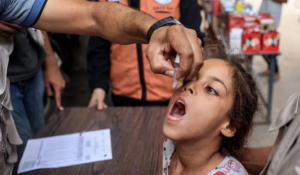The conspiracy theory accompanying the polio vaccine into Gaza

A girl receiving a polio vaccination in Deir el-Balah in central Gaza on 4 September 2024
Nagham Zbeedat reports in Haaretz on 4 September 2024:
In recent months, a new fear has taken hold of Palestinians in Gaza: polio. Last month, a baby contracted the disease, the first case of polio in the enclave for 25 years, yet another thing to worry about in a life of war and displacement.
While parents’ natural response might be to have their children vaccinated – such a campaign began last week – a high-profile influencer has asked whether the vaccine should be trusted, as it has been allowed in by Israel.
Conditions in Gaza are ripe for the spread of disease: inadequate access to clean water, a malfunctioning sewage system, crowded shelters, food insecurity and a collapse of the entire health system, not just the vaccination services.
The campaign has been launched by the World Health Organization, the Palestinian Health Ministry, UNICEF and other humanitarian organizations, in collaboration with Hamas and Israel, which both agreed to a limited pause in the fighting in certain areas. Hamas is “ready to cooperate with international organizations to secure this campaign,” Basem Naim, a senior Hamas official, has said.
But in a video on Instagram this week, the activist and vlogger Bisan Owda questions whether the vaccine is truly a benign instrument. Owda – who is known for her reporting on life under constant threat since the beginning of the war – is also currently nominated for an Emmy Award for her short documentary “It’s Bisan From Gaza and I’m Still Alive.” She has 4.7 million followers on Instagram.
In the video on the vaccine, she shows a screenshot of an anonymous email she says she received. The message reads: “Hi Bisan, please warn as many people as you can. Someone who wants you all dead will never prevent a disease from doing their dirty job for him. DON’T LET KIDS TAKE THE VACCINE. You know it’s bad when Israel wants to take a day break from killing civilians to give a ‘vaccine’ to protect the civilians it wants to kill from diseases.”
In the video, Owda says in English: “The Israeli occupation intentionally killed a whole generation, a whole generation, 17,000 kids. … How can I trust these people, and trust their trials, to allow the vaccines to enter the Gaza Strip?”
The controversy surrounding the vaccine reflects deep-seated mistrust among Gazans toward any entity not rooted in the local community, including humanitarian organizations. “I don’t trust anything … I don’t trust humanitarian institutions, I don’t trust the occupation,” Owda declares. “I only trust the memory of my people and my memory.” Such skepticism resonates among Palestinians and pro-Palestinian groups, which often view the Western media as part of the problem when it comes to shortcomings in reporting on the Gaza war, according to a Palestinian journalist who spoke to the Ankara-based Anadolu Agency.
Owda duly showed a screenshot of a France 24 article about the detection of the poliovirus in sewage water in Gaza, as reported by the Gazan and Israeli health ministries, underscoring her skepticism about the news outlet.
She also drew attention to an Arabic headline published by Al Arabiya that read, “‘From the Outside’: A Palestinian Health Minister Reveals the Source of the Poliovirus.” In the article, Palestinian Health Minister Majed Abu Ramadan said the virus “did not originate in Gaza but was somehow introduced from outside the Strip.”
Some people support Owda’s skepticism, echoing sentiments like “polio is not more dangerous than blowing kids into bits,” with the vaccine being “just another colonizer move,” as a U.S.-based therapist commented about Owda’s video.
Still, the majority of people providing their opinion, especially among Gazans, are urging caution. Many people online, including medical professionals, are recommending that Owda delete the video and apologize.
They fear that even more children can die if they do not get vaccinated. “Any child that doesn’t take the vaccine and develops polio because of your video is your responsibility,” said Sara Al-Saqqa, a surgeon in Gaza.
Israel, of course, hopes that any polio wave in Gaza will not spread beyond the border, but some critics on social media are still speculating that it is taking part in the vaccination campaign merely as a means to polish its image around the world.
This article is reproduced in its entirety
